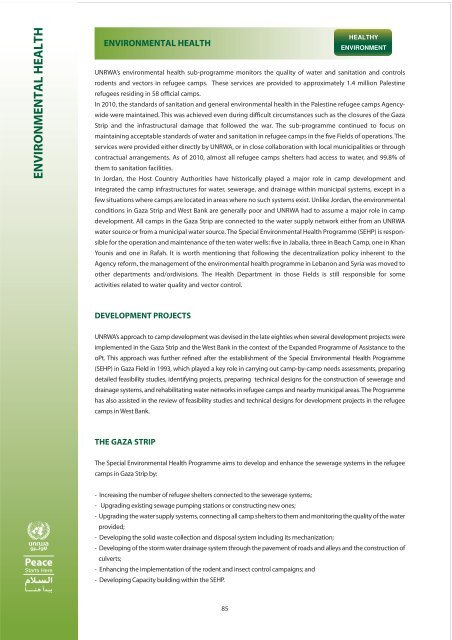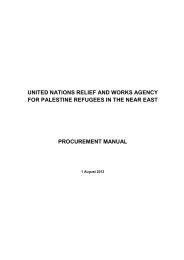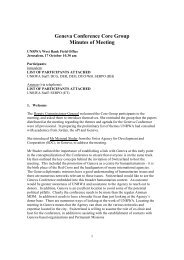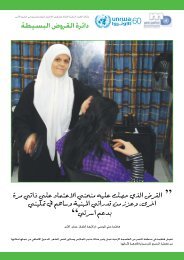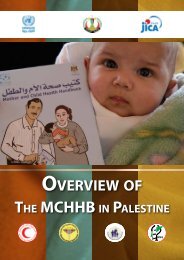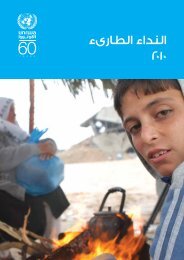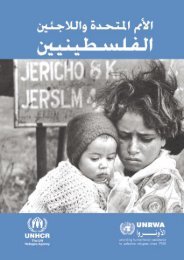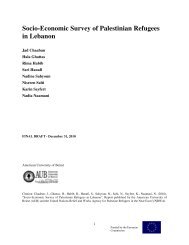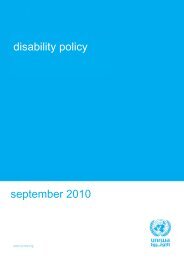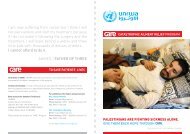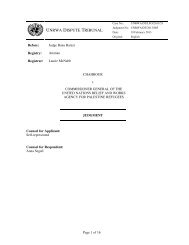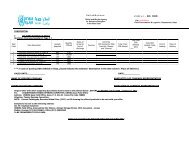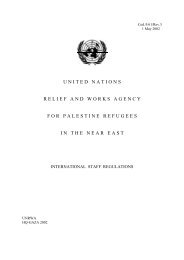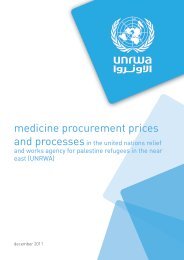Annual Report of the Department of Health 2010 - Unrwa
Annual Report of the Department of Health 2010 - Unrwa
Annual Report of the Department of Health 2010 - Unrwa
You also want an ePaper? Increase the reach of your titles
YUMPU automatically turns print PDFs into web optimized ePapers that Google loves.
ENVIRONMENTAL HEALTH<br />
ENVIRONMENTAL HEALTH<br />
HEALTHY<br />
ENVIRONMENT<br />
UNRWA’s environmental health sub-programme monitors <strong>the</strong> quality <strong>of</strong> water and sanitation and controls<br />
rodents and vectors in refugee camps. These services are provided to approximately 1.4 million Palestine<br />
refugees residing in 58 <strong>of</strong>ficial camps.<br />
In <strong>2010</strong>, <strong>the</strong> standards <strong>of</strong> sanitation and general environmental health in <strong>the</strong> Palestine refugee camps Agencywide<br />
were maintained. This was achieved even during difficult circumstances such as <strong>the</strong> closures <strong>of</strong> <strong>the</strong> Gaza<br />
Strip and <strong>the</strong> infrastructural damage that followed <strong>the</strong> war. The sub-programme continued to focus on<br />
maintaining acceptable standards <strong>of</strong> water and sanitation in refugee camps in <strong>the</strong> five Fields <strong>of</strong> operations. The<br />
services were provided ei<strong>the</strong>r directly by UNRWA, or in close collaboration with local municipalities or through<br />
contractual arrangements. As <strong>of</strong> <strong>2010</strong>, almost all refugee camps shelters had access to water, and 99.8% <strong>of</strong><br />
<strong>the</strong>m to sanitation facilities.<br />
In Jordan, <strong>the</strong> Host Country Authorities have historically played a major role in camp development and<br />
integrated <strong>the</strong> camp infrastructures for water, sewerage, and drainage within municipal systems, except in a<br />
few situations where camps are located in areas where no such systems exist. Unlike Jordan, <strong>the</strong> environmental<br />
conditions in Gaza Strip and West Bank are generally poor and UNRWA had to assume a major role in camp<br />
development. All camps in <strong>the</strong> Gaza Strip are connected to <strong>the</strong> water supply network ei<strong>the</strong>r from an UNRWA<br />
water source or from a municipal water source. The Special Environmental <strong>Health</strong> Programme (SEHP) is responsible<br />
for <strong>the</strong> operation and maintenance <strong>of</strong> <strong>the</strong> ten water wells: five in Jabalia, three in Beach Camp, one in Khan<br />
Younis and one in Rafah. It is worth mentioning that following <strong>the</strong> decentralization policy inherent to <strong>the</strong><br />
Agency reform, <strong>the</strong> management <strong>of</strong> <strong>the</strong> environmental health programme in Lebanon and Syria was moved to<br />
o<strong>the</strong>r departments and/ordivisions. The <strong>Health</strong> <strong>Department</strong> in those Fields is still responsible for some<br />
activities related to water quality and vector control.<br />
DEVELOPMENT PROJECTS<br />
UNRWA’s approach to camp development was devised in <strong>the</strong> late eighties when several development projects were<br />
implemented in <strong>the</strong> Gaza Strip and <strong>the</strong> West Bank in <strong>the</strong> context <strong>of</strong> <strong>the</strong> Expanded Programme <strong>of</strong> Assistance to <strong>the</strong><br />
oPt. This approach was fur<strong>the</strong>r refined after <strong>the</strong> establishment <strong>of</strong> <strong>the</strong> Special Environmental <strong>Health</strong> Programme<br />
(SEHP) in Gaza Field in 1993, which played a key role in carrying out camp-by-camp needs assessments, preparing<br />
detailed feasibility studies, identifying projects, preparing technical designs for <strong>the</strong> construction <strong>of</strong> sewerage and<br />
drainage systems, and rehabilitating water networks in refugee camps and nearby municipal areas. The Programme<br />
has also assisted in <strong>the</strong> review <strong>of</strong> feasibility studies and technical designs for development projects in <strong>the</strong> refugee<br />
camps in West Bank.<br />
THE GAZA STRIP<br />
The Special Environmental <strong>Health</strong> Programme aims to develop and enhance <strong>the</strong> sewerage systems in <strong>the</strong> refugee<br />
camps in Gaza Strip by:<br />
- Increasing <strong>the</strong> number <strong>of</strong> refugee shelters connected to <strong>the</strong> sewerage systems;<br />
- Upgrading existing sewage pumping stations or constructing new ones;<br />
- Upgrading <strong>the</strong> water supply systems, connecting all camp shelters to <strong>the</strong>m and monitoring <strong>the</strong> quality <strong>of</strong> <strong>the</strong> water<br />
provided;<br />
- Developing <strong>the</strong> solid waste collection and disposal system including its mechanization;<br />
- Developing <strong>of</strong> <strong>the</strong> storm water drainage system through <strong>the</strong> pavement <strong>of</strong> roads and alleys and <strong>the</strong> construction <strong>of</strong><br />
culverts;<br />
- Enhancing <strong>the</strong> implementation <strong>of</strong> <strong>the</strong> rodent and insect control campaigns; and<br />
- Developing Capacity building within <strong>the</strong> SEHP.<br />
85


